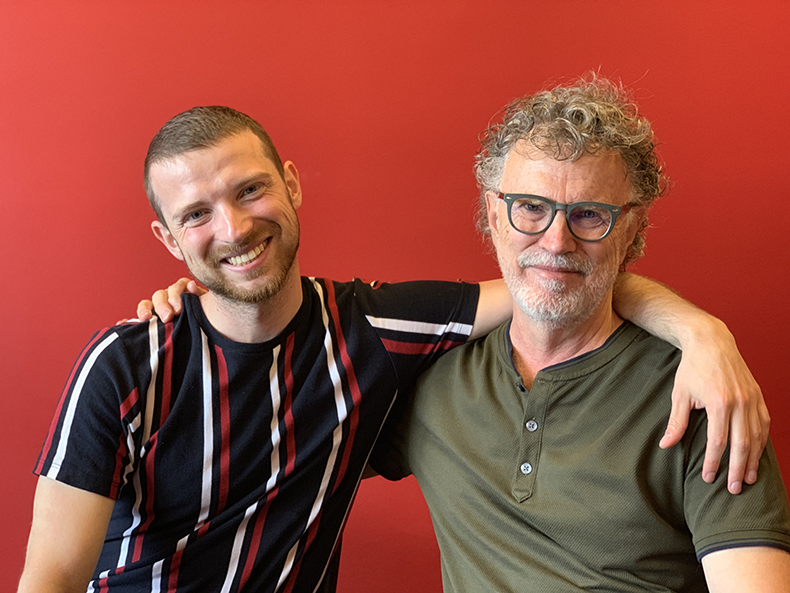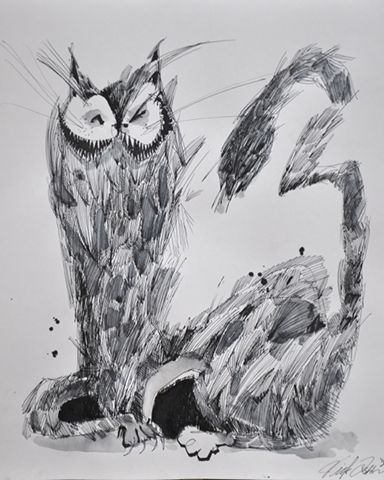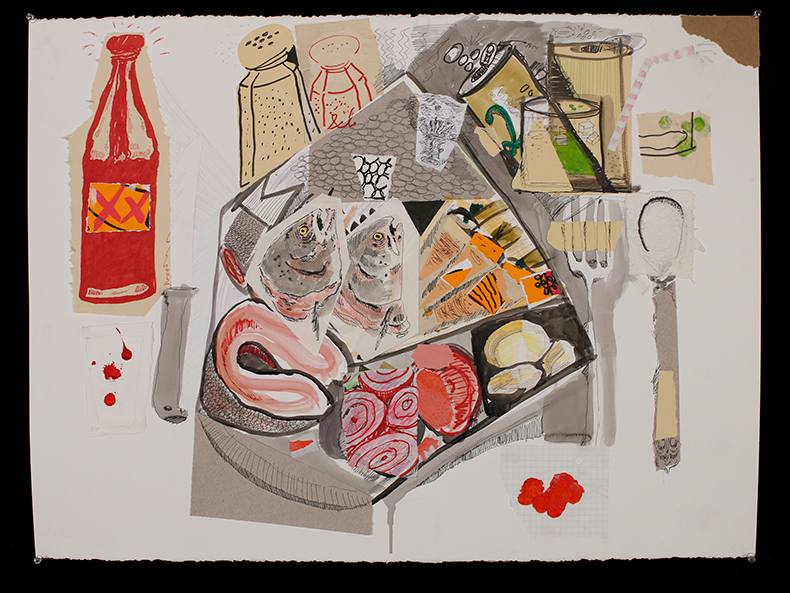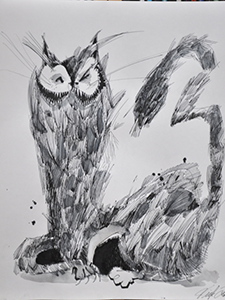Bill Austin, Reference & Learning Services Specialist, AUArts
AUArts Alum 1977, Diploma | Painting
Nick Austin, Third-Year Law Student, UofC
AUArts Alum 2015, BFA | Drawing

Left to Right: Nick Austin and his Father Bill
AUArts: Can you start by telling me what you do?
Bill Austin: I work here in the library. I've been here about 20 years now.
I started as a student in 1973, the same year this building opened. I started as a student and graduated in ’77 with a diploma in Painting.
Nick Austin: I’m a law student. I'm just about to go into my last year of law. Right now, I'm working as a research assistant at the University of Calgary. I graduated in 2015 with a BFA in drawing.
AUArts: What drew each of you to come to AUArts?
Bill: I dropped out of high school in Grade 11 and worked at some other jobs. I was talking to a guidance counselor at Bow Valley College and he suggested that I could come here. I must've said that I was interested in art. He told me that you didn't need a high school diploma at that time.
So I did all the entrance stuff, and the first year I was waitlisted. I was accepted in 1973, the year this building opened.
Nick: Both my parents had done their undergrads in art. My mom did a degree in Sculpture at U of C, and my dad had Painting. So for me, it seemed like the natural thing to do.
Growing up, they'd always stressed how important it was to be creative. Even when I was a little kid, you'd always bring pens and pencils and paper to restaurants to keep me occupied and give me a sense that this is actually important. You're not just fooling around; you're developing yourself.
Growing up, they'd always stressed how important it was to be creative. Even when I was a little kid, you'd always bring pens and pencils and paper to restaurants to keep me occupied and give me a sense that this is actually important. You're not just fooling around; you're developing yourself.
So I was aware from a very early age that this was something I could have a career in, and something that I could definitely go to school for, because both my parents had been there and it had really helped them in their professional lives. For me, it felt very natural.
AUArts: Can you tell me about the paths that you took after graduation?
Bill: After I graduated, I got a job at the post office and got married. I learned while I was here that I wasn't really a visual person. I was more interested in English and the humanities, so I went back to university and got a bachelor's degree and a master's degree in English. I stayed at home with Nick for probably five or six years till he got into school. And then I got a job here working in the library.
AUArts: You must have seen so many changes in the last 20 years, in how AUArts has evolved.
Bill: My job now is totally different than it was 20 years ago when I started. There’s been more of a stress on critical and creative thinking, and art history. Those things now are such a big part of a degree here. I had to become more familiar with how libraries relate to those areas.
Then things just went digital, and that exploded everything. So now a lot of what I do has to do with learning management systems and copyright issues, especially around digital reproduction.
AUArts: How did your time at AUArts prepare you for this job?
Bill: Having an art background is really essential to doing the reference and critical creative thinking around visual arts rather than English, which is my degree.
But the other thing that actually was of value to me was being a high school dropout. I wasn’t a good scholar when I came to AUArts, but I became one. I discovered as an adult that I could be really good in school. And that has helped me to relate to some of the younger students who start here and aren’t confident about the scholarly side of getting a university degree.
I think a lot of times, we come out of high school with a pretty fixed attitude of who we are – that high school was difficult and you can't change that. But I actually discovered that you can change that. And that was really valuable to me.
AUArts: Nick, how did you come to study law? You’re in your final year now.
Nick: While I was at AUArts my final year, I was on the students’ association. I was the Vice President of Academic Affairs, which is a student advocate. If somebody wanted to appeal a grade or they'd been accused of academic or nonacademic misconduct, I was the student who would go in with them to those hearings. And prepare them and advocate on their behalf.
I love art. I'm always going to be an artist, but I learned that I was good at this too. And I don't think that's an opportunity I would have had at another school. If you want to become involved in student government, or advocacy or sitting on the mental health task group, you can do it at AUArts, because it's smaller.
Bill: I think that's a really good point about being a smaller school. People always talk about ratio, but there’s also the ability to get involved.

AUArts: Did you know what you wanted to do when you came to AUArts?
Nick: I really thought I was going to be a gallery artist. It's sort of something that's been in my family. My grandmother was a gallery artist; she was a painter. And her father, who she didn't really know was also an artist. I thought I'd probably graduate and do art full time. I had some teachers, like Don Kottmann, who really inspired me and made it a difficult decision for me to go into a different field.
AUArts: How so?
Nick: He really turned me into an artist. He challenged me. If I made a statement during a critique, he was always the guy asking, well, why is that? Why do I need to see that? He really worked us, too. I think I did 50 drawings a week. That class was so rewarding.
In my final year, I was still torn. I was having a ton of fun and I enjoyed the student government stuff too. I didn't really know what I was going to do, but it was nice to have a lot of options.
Bill: It wasn't just your parents were artists, but also your grandmother and grandfather. Your great-grandparents were both artists too.
Nick: I recently found out that I'm related to one of Charles Dickens’ illustrators. Luke Fildes is the guy's name. It’s definitely in my blood, and my parents raised me to respect it and treat it as something that was important, and was a part of my identity and a part of how I would be able to express myself and grow and become who I am. So it was tough.
AUArts: How do you think going to AUArts will prepare you for becoming a lawyer?
Nick: On the academic side, I came in straight from high school, and one of my first classes was an art history class. And I was very, very confident. I thought I knew how to write an essay. It was going to be easy.
And I remember I came out of that class with a C or C- and realized, this isn't going to cut it anymore. University’s different. I need to learn what it means to be a critical thinker and an academic.
That was the wake-up call for me. That I'm not just going to be coming here and drawing stuff, and going home at five every day. There's this academic component. And it's a degree too, so there's a lot of value there. I realized that I had to grow up a bit here. Luckily there was a lot of support.
AUArts: Can you tell me about the community here at AUArts?
Nick: I really liked opening nights on Thursday.
AUArts: What's that?
Nick: That would be when all the gallery openings are, and usually there'll be a few openings at AUArts – I don't know if it's Thursday anymore. It was sort of an on-campus and off-campus thing.
So if you went downtown to the galleries, you'd end up bumping into professors and other students. If you had an event down in Kensington, for example, people were pretty good about showing up. Even the profs. So it was kind of cool, if you had art displayed in Kensington or downtown, senior professors would show up and chat with you.

AUArts: What’s the most important thing you learned here at AUArts?
Bill: Art is very hard. I don't think people realize that it's a very complex world, and art is to reflect that world as to understanding and live in complexity. So I think living with complexity is probably what I learned here.
Nick: I don't really think you can teach critical thinking. But if you are interested in AUArts, if there's something there that strikes you as interesting or appealing, I think it's probably in you to some extent. You just need to learn how to channel that. And this is a place that can help you do that.
As an artist, I think your head's full of clutter and dissonance often on a very personal level, and you need to figure out how to organize that and express it and get across what you're trying to say. I think that is exactly the same as a profession like law where there's not necessarily an answer.
There are all sorts of cases, journals, a jumble of ideas and common law, and some of it hasn't been properly articulated yet. You have to consolidate it and get it down in a fixed form on paper.
And sometimes you have to deal with ambiguity, which is not easy to do. You have to learn how to respond to being challenged in the critique environment. I found that really helpful, especially for people who are a bit more shy, and not used to public speaking. Or justifying what they're doing to other people, the critique environment really brings that out.
To get up in front of people and say, this is my idea. This is why I made the decisions that I did, developing confidence in saying that I did this, and it was for this reason. Those skills have really translated well for me, especially in debates and mock trials. Getting up in front of an audience and saying, this is why I made this decision. I feel confident that I can justify it. I feel like my voice is worth hearing. People are going to listen to me, and I'm able to take this clutter and dissonance and make it into something meaningful.
AUArts: I like the parallels you've made between art and law. It makes sense.
Nick: In high school, there's always an answer. You go into Social Studies 30 or Art 30, and you master that course and you come away with a credit. At AUArts, if you're a person who really likes answers, you're not going to find them there. But that's really life affirming at the same time. Because you realize it's a lifelong pursuit.
AUArts: All the answers are not in the book.
Nick: Yeah. You have to learn how to deal with open-endedness. Because life's open-ended.
That kind of blew my mind coming into AUArts from high school. In high school where there always was an answer and it was right or wrong.
At AUArts, if you're a person who really likes answers, you're not going to find them there. But that's really life affirming at the same time. Because you realize it's a lifelong pursuit.
AUArts: What advice would you give to someone whose parents don't want them to pursue an art degree? What encouragement would you have offered your high school self?
Nick: It’s more and more a really valuable degree. I think employers are looking at arts degrees. They’re taking them a lot more seriously. I think grad schools and universities are taking them a lot more seriously.
Because of that critical thinking aspect. It is a professional type degree. No matter what you want to go into, it's going to give you an edge.
I can see with my parents too, with my mom doing an arts degree and going into architecture, which makes sense too. You know, there's sort of linearity there.
And then my dad going into English, taking a more academic path. It's not a dead end.
AUArts: It kind of opens you up to different paths and possibilities.
Nick: You don't have to be a “capital A” gallery artist coming out of AUArts. It’s a degree that you get what you put into it. There are lots of opportunities to challenge yourself, or gear it towards something that you're interested in. If you're becoming interested in student politics and you want to take that angle, or you're more interested in academics and you want to load up on English and Critical Studies courses. It's a pretty malleable degree.
AUArts: Bill, do you have anything that you want to add in terms of talking to your high school self?
Bill: The one thing that I think is really important that I wanted to leave you with was something that had happened to me on Recruitment Night when there were a lot of parents here with the kids.
One of the recruitment people said to me, “Bill’s son is going to come here. He could tell you why he's doing that.” And what I said to those parents is that this is a very small institution, and your kids are going to have face-to-face relationships with their instructors, especially the studio instructors. And when you have face-to-face relationships with people, it becomes a very safe, nurturing environment.
In terms of educational ratios, that's great. But when you have a personal face-to-face relationship with somebody, it becomes a very safe environment. You’re sending your kids out into the world, and it’s a very nurturing environment. It’s very important for parents to know that.
